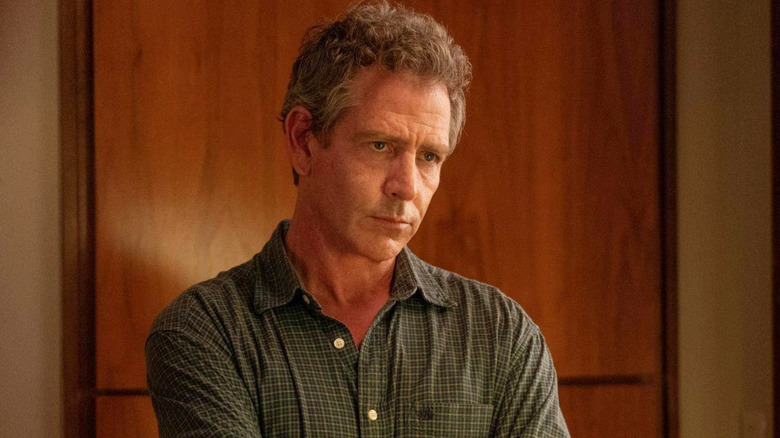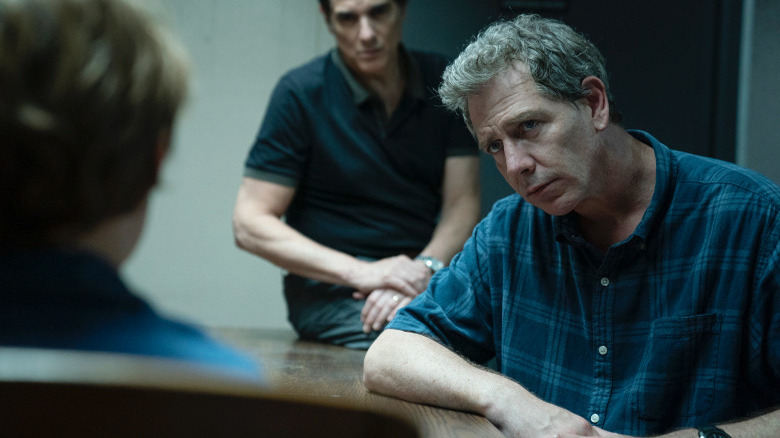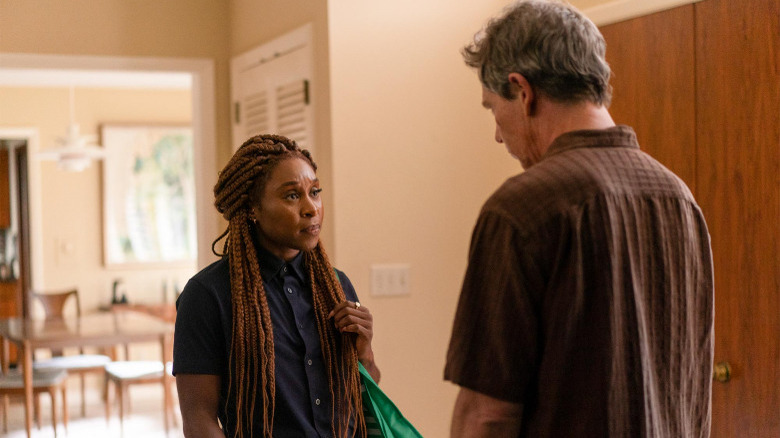Richard Price Had To Start From Scratch When Adapting Stephen King's The Outsider
Richard Price wasn't exactly the most obvious choice to adapt Stephen King's 2018 book "The Outsider" into a TV mini-series. Far from a novice in this area, Price had already adapted novels like "The Color of Money" and even his own books "Clockers" and "Freedomland" into films. But his speciality had always been crime thrillers and mysteries that pit their leads against firmly human horrors, rather than fantastical foes like the creature at the heart of King's story.
In Price's hands, "The Outsider" is less "IT" and more "True Detective," despite the ancient child-killing entity at the heart of its plot. It's also a ghost story, if not in the typical sense. In a change from King's original novel, the show's protagonist, detective Ralph Anderson (Ben Mendelsohn), is haunted by the death of his young son from cancer some years prior to the series' events. As Price saw it, this reframing of the character was not only vital in terms of his personal investment in cracking the case, but it also fed into what Price came to see as the narrative's core theme (and that of any ghost story, really): grief.
'I'd always wanted to write a ghost story'
"The Outsider" begins with the murder of a young boy in Cherokee City, Georgia, a horrifying crime made all the more disturbing by the mutilated state of the victim's corpse. At first glance, there's nothing inherently supernatural about the situation. All the physical evidence clearly points to Terry Maitland (Jason Bateman), a local teacher and Little League coach, being the perpetrator. For Ralph, who heads the investigation, it's an open-and-shut case.
"It's this combination of a police procedural that takes this twist into the supernatural without ever quite leaving the police procedural world," Richard Price told Variety in 2020. He added, "The easiest thing for me to write is the police world and ever since I was a kid, I'd always wanted to write a ghost story."
Complications arise when recovered security camera footage and testimonies from multiple witnesses confirm Terry was out of town at a teachers' conference when the murder took place. By the time another shocking twist transpires in the series' second episode, Price was already halfway through adapting Stephen King's book, and the alterations he had made were quickly adding up. "You have to kind of write it like there was no book because if you write it with any kind of assumption, you lose them right away," said Price.
For related reasons, Price was never wary of re-inventing King's source material, explaining:
"It's definitely [King's] story, for sure, and his characters, but adding this wrinkle or this location, and the whole point of that is to keep it as fascinating as you can. The only thing a script of any kind owes to a novel that's being adapted is the spirit. You have to make compromises for the medium..."
Improving on King
As the investigation carries on, Ralph comes to work with Holly Gibney (Cynthia Erivo), a possibly neurodivergent private detective who reasons that, having ruled out any rational explanation, there must be a supernatural factor at play in the Maitland case. Ralph, on the other hand, refuses to even consider the possibility at first. "He believes only in things like witnesses' statements, interviews, DNA," Price noted. "His goal is finding hard stuff that will lead to a conviction."
This is where the death of Ralph's son, Derek, really comes into play on "The Outsider." Besides giving Ralph what Price called "more of a personal stake in the loss of children," it puts him in a fragile state of mind. As much as he resists the idea the real killer is a monster capable of mimicking others' appearances, there's some part of Ralph that wants to believe he will see his son again after he dies.
At one point, Ralph even has a ghostly vision of Derek telling him to "let him go." But is this real, a figment of Ralph's imagination, or merely an illusion created by the story's villain to try and tap into Ralph's grief? It's his uncertainty that not only fuel Ralph's arc on the show, it also gives greater depth as a character than he had in Stephen King's novel (where King simply had Derek away at summer camp so as to "get the kid out of the picture," as Price put it).
Thanks to these changes, "The Outsider" ultimately works better as a TV show, improving on its source material while staying faithful to its spirit. Even the King of Horror himself would be remiss not to admit: Sticking close to the text of his novels isn't always a great idea.


